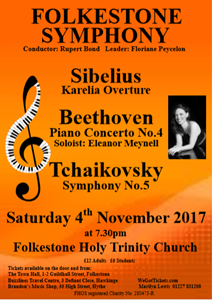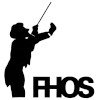Saturday 4th November 2017

Sibelius - Karelia Overture
Beethoven - Piano Concerto No. 4
(Soloist - Eleanor Meynell)
Tchaikovsky - Symphony No. 5
Holy Trinity Church
Sandgate Rd
Folkestone
CT20 2HQ

Review
Notwithstanding the swirling rain and competition from Guy Fawkes fireworks, Folkestone Symphony once again attracted an audience of over 200 to their concert in Holy Trinity Church, Folkestone on Saturday November 4th. Those in attendance at this event, which included a raffle to raise money for the Charity Odyssey, were well rewarded.
The evening opened with the Karelia Overture by Sibelius, a composer who is becoming a real speciality for this group of players. They explored with dexterity and care the fabric of the Finnish composer’s typically evocative portrayal of his homeland in this opening section of the music written to portray the beauty of his native land – the violas, in particular, providing luxuriance of tone. The whole range of a widely scored wind section captured the raw and passionate invention of the young Sibelius, even if we yearned for the strong tunes and rhythmic drive of the movements of his more familiar Suite.
The first half was completed by the fourth of Beethoven’s five piano concertos. We perhaps always expect a tempestuous sound from this composer (and, indeed Beethoven playing himself in the first performance of this concerto knocked both candlesticks off the instrument) but this performance, by pianist Eleanor Meynell was lyrical and touching in its gentleness.
It is an unusual piece with the piano starting by itself and this soloist’s intensely quiet and contemplative beginning set the tone for the whole piece. The first movement blossomed richly with delicate pizzicato and beautifully sensitive accompaniment masterfully directed by the conductor, Rupert Bond. The second movement – in which no wind instrument plays and the orchestra and piano never sound together – was a fascinating discourse. It really is music ahead of its time, and in the capable hands of this string section, led with authority and composure by Flo Peycelon, we were treated to every bitter-sweet twist and nuance of the relationship between soloist and players – both always controlled but never overstated. It was in the third movement that the brilliance of Miss Meynell really shone through – such evenness in the contrary runs which are the centre of this rondo, and you could just feel the fun that the orchestra were having playing counterpoint to the jaunty melody and embellishments accomplished with finesse by the soloist.
Despite its familiarity, the imposing end piece to this concert – Tchaikovsky’s Symphony No. 5 in E minor – is another repertoire standard which defies norms. It is in turns brooding and celebratory; it is carefully structured, but it twists and evolves in extraordinary directions; it has provoked slating criticism and yet was hailed as the saviour of a nation during the Leningrad siege of 1941; above all, its glorious tunes, its flamboyance, its drive and the way it speaks to the soul make it a piece always anticipated with pleasure.
From the opening hushed tones of the clarinets stating the motto theme, it was clear that Folkestone Symphony were not going to disappoint. The movement grew with measured tension – plaintive rather than tragic but always pulsating with drama. Tchaikovsky was a master of orchestral dialogue and no department here was found wanting, although perhaps the syncopated downward motif of the brass at the climax deserves special mention as does the well-ordered pacing theme in the ‘cellos and basses which ends the movement.
The Andante cantabile which follows is justly famous and tonight it began wonderfully with the tantalisingly soft but lush tones of the lower strings preparing us for that horn solo , played by Tracey Golding, which was, well, just immaculate. The audience was spellbound as the music grew, eloquent melody mounting on each flowing phrase with the clarinet introduction of the second theme breaking through with magnificence. Fate intervenes again in the form of the motto
powerfully delivered – and the music reaches a moment of pause before the strings begin the accompaniment again like a giant harp. This time, the theme played on the first violins was just gorgeous with an equally lovely descant on the oboe.
The third movement is tricky – all its waltzes requiring precision playing and neat rubato – well accomplished on this occasion. By the time the motto theme returned the coherence of tonight’s interpretation of the symphony was becoming apparent – variety of theme and mood as it should be, but held together with that sense of foreboding so characteristic of the composer, but foreboding which is ultimately, we know, to be transcended by triumph.
That sense of impending victory shone out as the motto theme, this time in the major key, began the finale. The ensuing march was furious but well balanced and every member of the band threw themselves into working the music up to a rewarding climax. The final maestoso treatment of the motto theme, although perhaps a little rushed, was exultant in mood and had the audience on their feet – a fitting end to a splendid evening of music.
David Pestell
